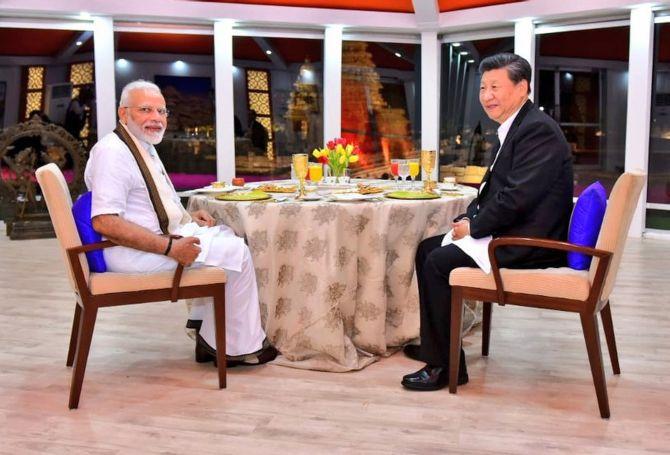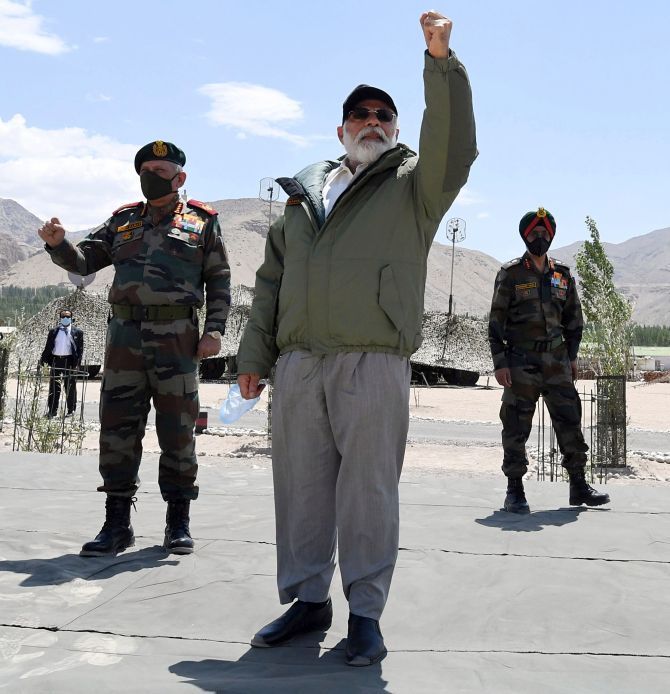 | « Back to article | Print this article |
Prime Minister Modi made a strategic blunder of Nehruvian proportions -- presuming no war can happen now, and the Chinese won't be a military threat and risk their economic interests, observes Shekhar Gupta.

As we anxiously watch Eastern Ladakh, a tough truth needs to be stated -- in the first five years of his rule, Prime Minister Narendra Modi made a strategic blunder of Nehruvian proportions.
Then we will also argue why, somewhat unlike Nehru's in 1955-1962, it was half a blunder.
We are making a reasoned presumption that when he took over in the summer of 2014 with a full majority, Mr Modi was confident there was going to be no war in his tenure.
In any case, the era of big wars between nations was over.
We are not sure if someone in his inner council would've read out to him American columnist Tom Friedman's famous 'golden arches' argument that no two nations have ever gone to war with each other ever since they acquired their McDonald's restaurants.
The logic was, once you are part of the global system, nations would not go to war if they have a vested interest in each other's bond prices.
Because it sounds simplistic, let's elaborate.
When nations become serious and substantive players in a globalised economy, as India and China have, the downside of an armed conflict will be economic more than military.
A new stability had been ushered in between large nations by this new mutually assured economic destruction.
Manmohan Singh had explained this to some of us in a rare meeting he had with senior editors.
I asked if America wasn't vulnerable, now that the Chinese, with their bulging reserves, were buying so heavily into their bonds and thereby financing the US deficit? What if the Chinese decided to dump American bonds?
Dr Singh answered this with a professor's fleeting smile.
If the Chinese do so, he said, the dollar would collapse and the yuan would equally strengthen.
That will in turn destroy China's exports. So, there was this new strategic balance.
And because there was going to be no war with either, there was no point investing too much additional money in defence budgets.
That India's big military modernisation could wait.
That is why for six years under Mr Modi, India's defence budget has declined, rather than rise, as a percentage of GDP.
This is in spite of a double blow -- the increased pension bill, with the implementation of 'one rank, one pension', an election promise.
And more significantly, the second, that GDP growth after his first two years slowed, first from a sprint to a canter, then a crawl, and now, free fall.

Since we do not have the benefit of sitting across with Mr Modi and understanding his mind, we can only make a reasonable guess.
That in May 2014, he made a presumption that the Pakistanis can't ever dream of taking Kashmir by force.
Just as Pakistan could never catch up with India militarily, India could not match China in the near future.
But China's economic stake in India was becoming higher with huge trade surpluses, and deeper with massive equity investment.
They were not going to be so foolish as to ruin their own party -- until the Chinese signalled change in Doklam, in the late summer of 2017.
Initially, Mr Modi reached out to both Pakistan and China.
His stopover to meet Nawaz Sharif on December 25, 2015, was entirely his own, instinctive decision that took the ministry of external affairs by surprise.
He was conscious that the reason Dr Singh failed to fulfil his desire to visit his native village in Pakistan was that he couldn't defy his officers who counselled risk aversion.
He was not Manmohan Singh, he was right to assert, and he would go where he wished.
It is just that soon afterwards he was forced to realise what each one of his nine predecessors -- from Indira Gandhi onwards -- did after making some errors: That real power in Pakistan lies elsewhere, not with the elected leader.
He then made a strategic turn, reinstating Pakistan in the eternal enemy slot.
It worked well with domestic politics, besides being true to his core constituency, and base, the RSS.
Pakistan, he would safely believe, was not going to be a military threat.
It was, on the other hand, an opportunity in domestic politics.
So, let it play out that way.
Uri, the surgical strikes, Pulwama-Balakot were evidence that the political strategy was working.
The Pakistan factor helped him sweep both the Uttar Pradesh (2017) and Lok Sabha (2019) elections.
On China, he made a different outreach, inviting Xi Jinping to his home state, drawing a cultural and historical connection personally, by reminding him that the place Chinese explorer Hiuen Tsang first visited after landing on India's coast was Vadnagar, his native village.
It also so happened that the explorer had lived in Xi's home town of Xian.
A personal equation, deep friendship, sugar-coated in the benefits of trade and investment, it was calculated then, would end the Chinese threat, or at least put it in a deep freeze.
The Chinese People's Liberation Army simultaneously violating the Line of Actual Control in Ladakh's Chumar sector was true to the pattern of their behaviour.
But there was an assumption made that it was probably the work of PLA generals acting without Mr Xi's approval -- happens when the Indian strategic mind gets conditioned by its Pakistan experience.
But the illusion ended in the course of time as the generals involved in the Chumar adventure, instead of being punished, were all promoted.

Nevertheless, summit followed summit and while Doklam was a warning, Wuhan again strengthened the impression that there wasn't going to be a direct military challenge from China.
Pakistan had limitations anyway, so military spending could wait.
There was probably some new concern and it expedited the Rafale process.
Yet, the purchase was pared down to 36 instead of the minimum 65 or thereabouts that the IAF wanted with the same confidence, in personalised diplomacy: A war is not a possibility.
Or, as Atal Bihari Vajpayee had written in his most famous poetry, hum jang na hone denge (we shall not let a war take place).
It was a strategic blunder.
The Balakot strike and the skirmish the day after were the first warning that India had allowed her edge to fray over time.
In the air, for example, the Pakistan Air Force outranged the IAF in beyond visual range missiles and more than matched it in Airborne Early Warning resources.
It was still, however, seen in the Pakistan context.
China was not top of the mind though the development of border infrastructure had gathered some pace -- until April 20 this year, when the Chinese came knocking rudely, first with fisticuffs, then primitive violence and sizable forces making deeper intrusions.
Why did the Chinese do this?
Why did they choose this time?
Were the changes in Kashmir and the assertion to take back Aksai Chin their only provocation?
This is where we bring up our original point.
That Mr Modi made a strategic blunder of Nehruvian proportions -- presuming no war can happen now, and the Chinese won't be a military threat and risk their economic interests.
But why did we follow on to call it half a blunder?
Because the call that a conventional war was near impossible was correct.
So, he was half right.
But the understanding of what will guarantee peace was flawed.
For that, India had to increase spending on defence after almost a decade of waffling under the UPA.
The key to peace in our difficult region is to always maintain a punitive superiority over Pakistan and a deterrent posture with China.
Both had suffered for lack of investment in the military.
The Chinese were watching.
Remember the Vajpayee-Brajesh Mishra doctrine of coercive diplomacy.
It was predicated on a decisive and punitive Indian military superiority over Pakistan.
They had also said then that for coercive diplomacy to work, the threat of war had to be so real that even we would believe it was for real.
It is likely that this is precisely what the Chinese are doing with us in Ladakh.
They are employing their military advantage for coercive diplomacy.
As the Indian Army's audacious response on the Kailash range has demonstrated, this isn't the India of 1962.
But when we go making emergency purchases from the Americans, on the back of our recent defence agreements, of much-needed winter clothing, in some important ways we've miscalculated and blundered again.
By Special Arrangement with The Print
Feature Presentation: Aslam Hunani/Rediff.com